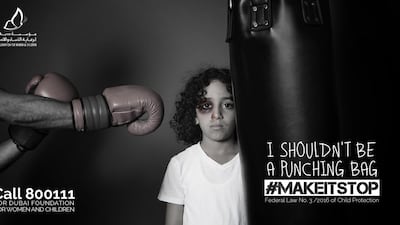An organisation that offers refuge and support to the victims of abuse in the UAE, dealt with more than 1,000 cases of violence and human trafficking in 2018.
The figures were released in the annual report of the Dubai Foundation for Women and Children (DFWAC). The organisation reported 1,027 cases in 2018, involving victims of domestic violence, child abuse, violence against women and human trafficking. The figure lowered from 2017, when the group had reported 1,433 cases.
There were 526 reported cases of domestic violence, 410 humanitarian cases, 52 instances of reported child abuse, 27 cases of violence against women and four of suspected human trafficking.
The centre supports people of all nationalities and residency statuses.
“I would urge people to pick up the phone and call us as abuse is not justifiable under any circumstance,” said Ghanima Al Bahri, care and rehabilitation director at DFWAC, who was speaking on the final day of the Dubai International Humanitarian Aid and Development conference on Thursday.
“I would urge people to take advice from a professional. Don’t take advice from family or friends as you don’t know their background and everyone will bring their own personal perspective and this can cause damage.”
Out of the 52 cases of child abuse that came to light, 54 per cent involved Emirati families. Females were victims in 63 per cent of these cases reported to DFWAC in 2018.
Fathers were abusers in 83 per cent of the cases, while mothers were blamed in 15 per cent of the accounts. The most common forms of abuse were emotional and verbal. Sexual abuse was cited in 8 per cent of the cases.
In 2017, the organisation reported it had dealt with 62 cases involving child abuse.
Ms Al Bahri said DFWAC was also paying particular attention to raising awareness among women coming to the UAE for the first time about the dangers of being trafficked.
“Some people coming to the country for the first time can be particularly vulnerable and are targeted by abusers,” she said.
“We have noticed that is happening a lot right now. Women are often promised a job here that pays a lot of money but they find the reality can be quite different.”
She said there were several cases where a woman had arrived in the country with the promise of marriage to someone claiming to have a lot of money, only to later discover they were being lied to.
“They are told they will be given UAE citizenship but then they discover that the person has not been telling the truth,” Ms Al Bahri said.
“He will say ‘let’s go and get married’ and she won’t know if the paperwork is legal or not. Abuse is always about manipulation and giving the wrong information.”
She said DFWAC would be focusing on women coming into the country for the next few years, to ensure they are given the right information.
“We will be helping women coming into the country to make sure they are aware how the system works and they do not get manipulated,” Ms Al Bahri said.
A spokesman for DFWAC said it was too early to share details of the campaign, but it could take the form of an organisation stationed at airports and other points of entry to the UAE.
“It is important to get the message across that people should make sure they have a letter from the Ministry of Labour confirming they have an actual job to go to,” he said.
“People should also be aware that they should not hand over their passports to anyone under any circumstances if they don’t have that confirmation.”
Eight cases of human trafficking were brought to attention in 2018. Majority victims were females and children represented 62.5 per cent of the claims.
The victims were mostly trafficked by someone who had promised them a job in the UAE.
The spokesman said it was vital that people were aware of what human trafficking involved. “It does not always apply to females either. If you are working and not being paid then you are being trafficked.”
In 526 reported incidents – 72 per cent – of domestic violence, husbands were the main abusers. Every single case involved verbal abuse and 7 per cent of the cases also reported sexual abuse. Financial abuse was cited in 58 per cent of the domestic violence cases .
Out of the 1,027 cases that DFWAC dealt with in 2018, 85 people were offered direct shelter in the organisation’s refuge facilities.


